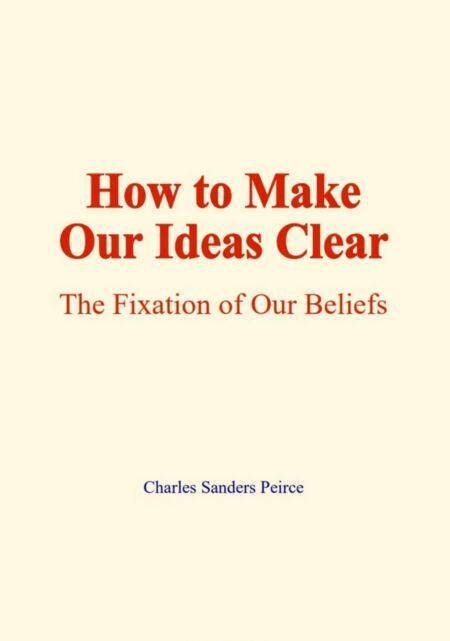
- Afhalen na 1 uur in een winkel met voorraad
- Gratis thuislevering in België vanaf € 30
- Ruim aanbod met 7 miljoen producten
- Afhalen na 1 uur in een winkel met voorraad
- Gratis thuislevering in België vanaf € 30
- Ruim aanbod met 7 miljoen producten
Zoeken
How to make our ideas clear E-BOOK
The fixation of our beliefs
Charles Sanders Peirce
E-book | Engels
€ 3,49
+ 3 punten
Omschrijving
How to make our ideas clear ?
Whoever has looked into a modern treatise on logic of the common sort, will doubtless remember the two distinctions between clear and obscure conceptions, and between distinct and confused conceptions. They have lain in the books now for nigh two centuries, unimproved and unmodified, and are generally reckoned by logicians as among the gems of their doctrine.
A clear idea is defined as one which is so apprehended that it will be recognized wherever it is met with, and so that no other will be mistaken for it. If it fails of this clearness, it is said to be obscure…
ABOUT THE AUTHOR
Charles Sanders Peirce (born Sept. 10, 1839, Cambridge, Mass., U.S.—died April 19, 1914, near Milford, Pa.) was an American scientist, logician, and philosopher who is noted for his work on the logic of relations and on pragmatism as a method of research.
Whoever has looked into a modern treatise on logic of the common sort, will doubtless remember the two distinctions between clear and obscure conceptions, and between distinct and confused conceptions. They have lain in the books now for nigh two centuries, unimproved and unmodified, and are generally reckoned by logicians as among the gems of their doctrine.
A clear idea is defined as one which is so apprehended that it will be recognized wherever it is met with, and so that no other will be mistaken for it. If it fails of this clearness, it is said to be obscure…
ABOUT THE AUTHOR
Charles Sanders Peirce (born Sept. 10, 1839, Cambridge, Mass., U.S.—died April 19, 1914, near Milford, Pa.) was an American scientist, logician, and philosopher who is noted for his work on the logic of relations and on pragmatism as a method of research.
Specificaties
Betrokkenen
- Auteur(s):
- Uitgeverij:
Inhoud
- Taal:
- Engels
Eigenschappen
- Productcode (EAN):
- 9782386264849
- Verschijningsdatum:
- 11/12/2024
- Uitvoering:
- E-book
- Formaat:
- ePub

Alleen bij Standaard Boekhandel
+ 3 punten op je klantenkaart van Standaard Boekhandel
Beoordelingen
We publiceren alleen reviews die voldoen aan de voorwaarden voor reviews. Bekijk onze voorwaarden voor reviews.











